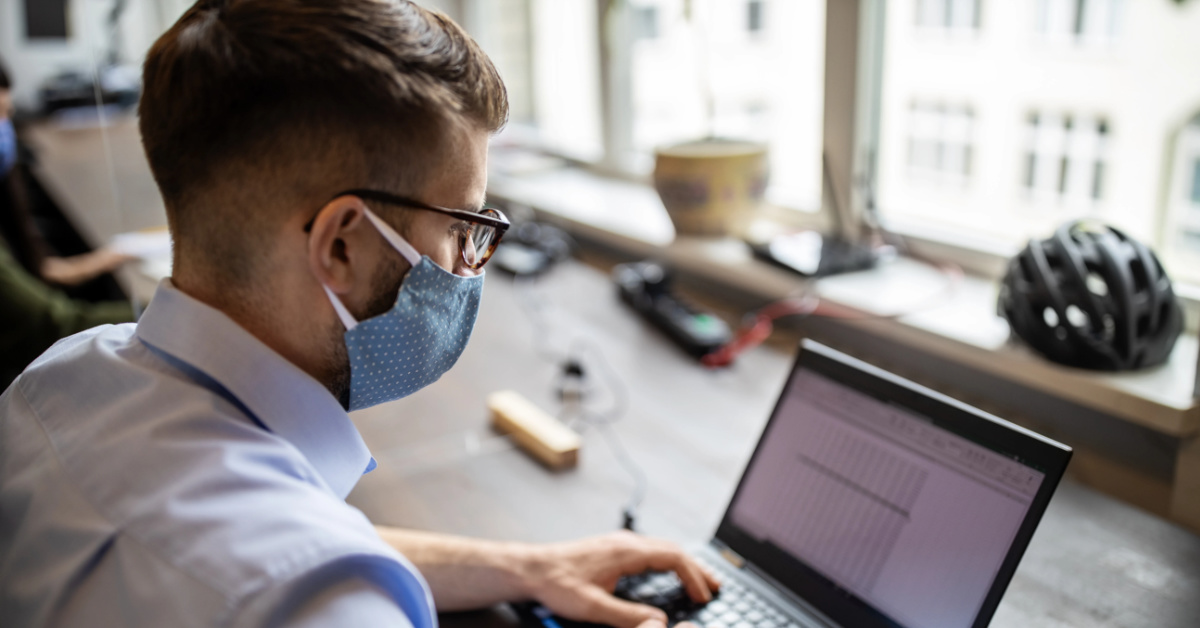COVID Fatigue Positive- Are you a victim of the Hidden Pandemic?- Part 3

Part 3. Working Professionals, Businesses and Organisations:
This is another group of people who have been hit hard by the pandemic. There does not seem to be any gender disparity in this group with men and women equally being affected. People are not having the social interactions they used to have- team meetings, lunches, office gossip. They have been subjected to social and professional isolation.
Those who have managed to keep their jobs unscathed by the lockdown layoffs, find themselves working from home. They report longer work hours, fewer breaks, and poor work-life balance. Weekdays and weekends have merged with people reporting that life has become monotonous. Many are reporting poor appetite, that can maybe be attributed to a steep decrease in physical activity. Sleep has become disturbed. Despite being at home, they feel they are spending lesser time with family.
Businesspeople have had to deal with the wave of uncertainty. The pandemic is creating an incredibly stressed and anxious workforce as well as clientele. Fear for health is taking a dominant place in the minds of people. People are worried about the consequences for themselves and their loved ones if they fall sick. This is leading to financial worries. Many report intrusive, pervasive negative thoughts that are making it hard to focus on work.
Those who have hit hard times in the work front due to the pandemic are noting a drop in self-confidence and are feeling uncertain about the future. The insecurities are gripping them and leading to a raise in psychosomatic disorders in which the stress the mind is going through is causing bodily distress.
A few symptoms noticed are:
- Chest/Stomach tightness
- Feeling short of breath and breathlessness
- Alcohol and other addictive substance misuse/addiction
- Going Blank in the head
- Inability to concentrate on tasks at hand
- Forgetfulness
- Feeling Shaky and unstable
- Feeling irritable and restless more than normal
- Difficulty getting work done
- Being indecisive
- Fear
- Feeling short of words
- Sleep disturbances
- Nightmares and upsetting dreams
- Feeling detached from your life and/or body
- Decreased Appetite
- Decreased interest in your close relationships and activities that you used to like
- Feeling numb
- Feeling very tired
- Appetite disturbances
These symptoms can vary in intensity over time.
You may experience any of these symptoms and you may find yourself preoccupied with these thoughts. This might be intrusive, had to shake off and might disturb your everyday life and work. They might be very emotionally and/or physically distressing.
If you experience such symptoms for more than a month or if they are severely distressing and if you feel you are having trouble getting your life under control, get professional help. Getting treatment as soon as possible can help prevent these symptoms from getting worse.
What else can help?
- Working professionals and Businesses can seek the services of mental health professionals who offer tele-consultations. Empathy and assurance from a qualified professional can go a long way and provide a safe, confidential place for promoting emotional well-being.
- Individuals and organisations can have a structured response plan for situations that may arise due to the pandemic- like if employee/family member gets sick; if there is going to be a layoff or pay-cut etc. This step will strengthen the organisation’s and its stakeholders’ resilience.
- Create a clear mental health strategy within the organisation. This can raise awareness as well as offer support.
- Try to take frequent breaks during work even if it is only 30-second breaks once in half an hour or 45 minutes.
- Prioritise work. Use to-do lists and productivity apps to make sure you get work done.
- Try to break the monotony of the weeks and make sure the weekdays are different from the weekends by ordering food, watching movies, having a family game night, or arrange to go for a drive with the family while taking all social distancing precautions.
- Keep physically active. Do at least 20 to 40 minutes of brisk exercise a day. Your housework or anything else you do as part of your everyday routine does not count as exercise.
- Sometimes following the news too much can be taxing your mind. If you feel you are getting worked up about the news and it makes you worried, try to keep a fixed minimum time each morning and/or night when you check the news. Do not read forwarded messages too much. Stick to reliable, trustworthy sources for information.
- Make sure you have a proper sleep routine and maintain work-life balance. Have an hour or two of gadget-free time everyday. Make sure your bedroom is a gadget-free room.
Contact Us if you are concerned about yourself or a loved one. Book an Appointment today.
Read More about the Emotional consequences of COVID-19:
Part 1: COVID-19 survivors:
https://www.ubhcare.com/post/covid-fatigue-positive-are-you-a-victim-of-the-hidden-pandemic-part-1
Part 2: The Everyday Lockdown Survivors- You and Me:
https://www.ubhcare.com/post/covid-fatigue-positive-are-you-a-victim-of-the-hidden-pandemic-part-2
Part 3: Working Professionals, Businesses and Organisations:
https://www.ubhcare.com/post/covid-fatigue-positive-are-you-a-victim-of-the-hidden-pandemic-part-3
Part 4: Children and Teens:
https://www.ubhcare.com/post/covid-fatigue-positive-are-you-a-victim-of-the-hidden-pandemic-part-4
Part 5: Healthcare Workers:
https://www.ubhcare.com/post/covid-fatigue-positive-are-you-a-victim-of-the-hidden-pandemic-final-part
Unified Brain Health Care is one of a kind Neuro Rehabilitation Centre in Chennai for adults and children offering in person and online therapy in Cognitive Rehabilitation, Clinical Psychology, Speech Therapy, Physiotherapy, Occupational Therapy, Clinical Nutrition, Career Counselling, Fitness Coaching and Educational Intervention. We also offer support for PCOS management, Pregnancy Care, Post-Pregnancy care for New Moms, Infant and Early Childhood Stimulation, Caregivers and promoting Holistic Brain Health.
